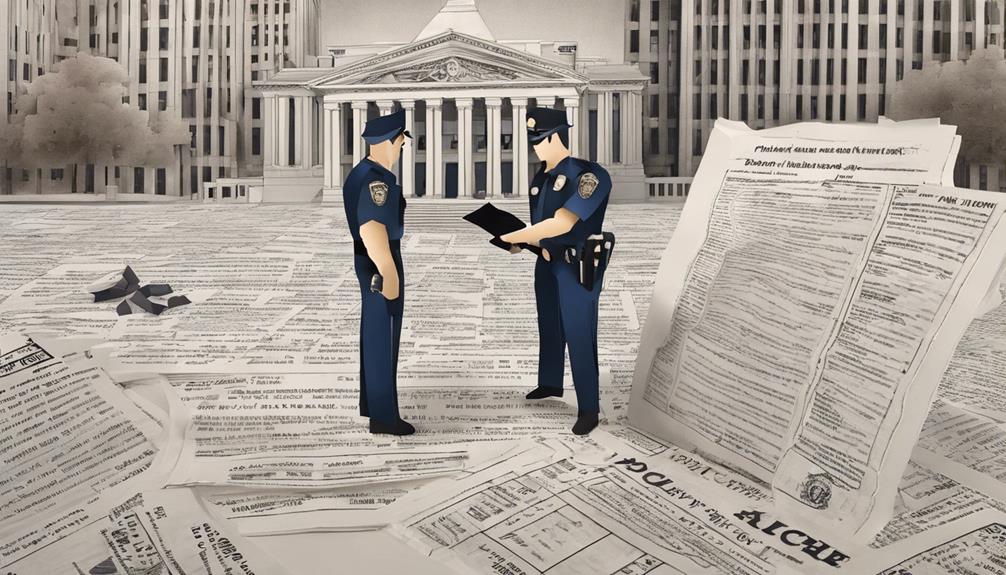Arrest warrants in Pennsylvania are legal orders indicating probable cause for an individual's arrest due to suspected criminal activities. They are issued by judges when evidence supports arrest. Bench warrants serve for court non-compliance, while search warrants allow specific location checks by law enforcement. Court appearances and potential penalties are necessary to resolve warrants. Understanding warrant types and legal procedures is essential. Seeking advice from a criminal defense attorney can offer valuable insights for efficient resolution. Legal representation aids in maneuvering complexities and protecting rights. Negotiating with the court could prevent arrest if legally warranted. Subtle nuances and additional insights are available on warrant processes in PA.
Key Takeaways
- Arrest warrants in PA signify probable cause of criminal activity.
- Issued by magisterial district judges based on credible evidence.
- Swiftly issued once evidence supports arrest.
- Empower law enforcement to make arrests.
- Understanding warrants helps navigate the legal system effectively.
Understanding Pennsylvania Warrants
When dealing with Pennsylvania warrants, it's important to understand the different types, such as arrest, bench, and search warrants, which are authorized by judges based on credible information.
In Pennsylvania, active warrants can have severe legal consequences, including arrest, potential jail time, and other penalties. Immediate action is essential when addressing outstanding warrants in the state to avoid escalating legal issues.
Various judicial authorities in Pennsylvania have the power to issue search warrants, allowing law enforcement to search specific locations for evidence related to criminal activities. Arrest warrants in Pennsylvania are typically issued by magisterial district judges upon finding probable cause for an individual's arrest.
Understanding the nuances of Pennsylvania warrants is crucial for individuals to navigate the legal system effectively and address any outstanding warrants promptly to avoid further legal complications.
Types of Warrants in PA

Pennsylvania utilizes three main types of warrants: arrest warrants, bench warrants, and search warrants.
Arrest warrants are issued when there's probable cause to suspect an individual of criminal activity.
Bench warrants are issued for individuals who fail to appear in court, while search warrants grant law enforcement the authority to search specific locations.
Arrest Warrant Basics
Various types of arrest warrants are issued in Pennsylvania by magisterial district judges based on probable cause provided by law enforcement officers. These warrants allow law enforcement to apprehend individuals suspected of committing a crime.
Here are some key points regarding arrest warrant basics in Pennsylvania:
- Issuance Process: A police officer must present a sworn affidavit detailing probable cause to obtain an arrest warrant in Pennsylvania.
- Prompt Authorization: Arrest warrants can be issued swiftly once the necessary evidence is gathered to support the arrest.
- Legal Procedures: Once apprehended, individuals with arrest warrants in Pennsylvania are typically processed and arraigned before the court to safeguard their rights and that due process is followed.
Bench Warrants Explained
Bench warrants in PA are issued by judges for individuals who fail to appear in court or violate court orders. When someone does not comply with their court obligations, a bench warrant may be issued, leading to potential arrest, jail time, and legal consequences. Law enforcement agencies have the authority to execute these warrants, bringing the individual before the court to address the situation. Resolving bench warrants typically involves appearing in court, addressing the underlying issue, and potentially facing penalties or fines.
| Bench Warrant | Pennsylvania | Court Orders |
|---|---|---|
| Non-Compliance | Arrest | Jail Time |
| Legal Consequences | Law Enforcement |
Search Warrants Overview
Law enforcement in PA utilizes search warrants to legally search specific locations or individuals for evidence based on probable cause. Search warrants in Pennsylvania are essential legal documents that grant law enforcement officers the authority to conduct searches in accordance with Pennsylvania law.
When executing search warrants, officers must adhere to strict procedures to make sure the search is conducted lawfully and ethically.
Here are some key points regarding search warrants in Pennsylvania:
- Search warrants require specific information and probable cause for approval.
- Officers must execute search warrants during daytime hours and announce their presence before conducting the search.
- Affiants can apply for search warrants electronically or in person, and various judicial authorities in Pennsylvania can approve them.
Understanding the process and requirements surrounding search warrants is important for both law enforcement officers and individuals involved in legal matters in Pennsylvania.
How to Search for Warrants

To search for arrest warrants in Pennsylvania, individuals can utilize online resources provided by the Unified Judicial System of Pennsylvania's web portal. The Unified Judicial System web portal offers statewide warrant information, allowing individuals to check for active arrest warrants easily.
Additionally, county sheriff's office websites, such as Montgomery County's, provide options for searching for warrants. If exploring these online platforms seems challenging, individuals may consider seeking guidance from a criminal defense lawyer who can assist in the search process.
For those who prefer a more direct approach, visiting local police stations or county courthouses in person can also help inquire about outstanding warrants. It's worth mentioning that warrants in Pennsylvania are considered public information, and alternative methods like having a trusted individual inquire on your behalf can also be explored to facilitate the search process effectively.
Consequences of Active Warrants

Active warrants in Pennsylvania can have serious consequences, including the possibility of arrest, time in jail, and legal penalties. Additionally, having an active warrant can hinder job prospects and cause challenges with background checks.
Addressing outstanding warrants promptly is essential to avoid potential legal troubles and disruptions in daily life.
Legal Repercussions of Warrants
Facing legal repercussions, individuals with active warrants in Pennsylvania risk arrest, jail time, and various consequences. The legal ramifications of having outstanding warrants can be severe and impact different aspects of one's life greatly. Here are some of the key repercussions individuals may face:
- Essential Job Opportunities: Employers often conduct background checks, and having active warrants can lead to missed job opportunities or even termination if discovered.
- Effect on Background Checks: Active warrants can show up on background checks, affecting one's ability to secure employment, housing, or loans.
- Impact on Daily Life: Dealing with the stress of possibly being arrested at any moment can take a toll on mental health and overall well-being.
It is vital for individuals with active warrants to address the situation promptly by seeking legal advice and taking the necessary steps to resolve the warrants to avoid further legal consequences and disruptions to their daily lives.
Impact on Daily Life
Having an active warrant can greatly disrupt an individual's daily life, leading to unexpected consequences and heightened stress levels. When encountering law enforcement, unexpected arrests can occur, triggering a formal booking process and the possibility of facing jail time.
Following the arrest, court proceedings may involve setting bail, impacting the individual's financial situation. Extended stays in jail can also result from arrests happening over weekends or holidays, further exacerbating the disruption to one's daily life.
The legal implications of an active warrant are significant, underscoring the importance of seeking guidance from a criminal defense attorney. Understanding the potential ramifications of arrest warrants is essential for individuals to navigate the complexities of the legal system effectively.
The impact on daily life stemming from active warrants underscores the need for proactive measures to address the situation promptly and mitigate the associated challenges.
Resolving a PA Warrant

Resolving a Pennsylvania warrant typically involves surrendering oneself to law enforcement for further legal proceedings. Seeking legal representation can help explore alternatives to immediate arrest.
Turning yourself in promptly after discovering a warrant is advisable. Hiring a criminal defense attorney can help guide through the legal process. Negotiating with the court may still result in arrest if legally required.
When faced with an arrest warrant in Pennsylvania, individuals are encouraged to take proactive steps to address the situation. Here are three key points to keep in mind when resolving a PA warrant:
- Self-Surrender: Turning yourself in promptly shows cooperation and may lead to a more favorable outcome.
- Legal Representation: Seeking the advice of a criminal defense attorney can assist in understanding the legal complexities and explore potential alternatives.
- Negotiation: While engaging in discussions with the court is possible, it's important to be prepared for the potential of arrest if deemed necessary by the legal system.
Are Warrants Public Records?

Warrants in Pennsylvania, including arrest warrants and search warrants, are considered public records under the state's Right-to-Know Law. These legal documents authorize law enforcement to take specific actions.
Arrest warrants in Pennsylvania empower the police to apprehend individuals suspected of committing a crime. On the other hand, search warrants grant officers the right to search for and seize evidence related to criminal activities. Additionally, bench warrants are issued in Pennsylvania when individuals fail to meet their court obligations, such as appearing for a scheduled hearing.
Various judicial authorities in Pennsylvania, including judges and magistrates, have the power to issue warrants. This system ensures that the issuance of warrants is a regulated process overseen by the appropriate legal entities.
As public records, warrants are subject to public access, allowing individuals to inquire about the existence and details of warrants issued in the state.
Arrest Warrant in PA

Arrest warrants in Pennsylvania are issued by magisterial district judges based on probable cause provided by police officers through affidavits. These legal documents play a vital role in the judicial process, enabling law enforcement to take individuals into custody in connection with criminal cases.
When dealing with an arrest warrant in PA, individuals should be aware of the following key points:
- Probable Cause: Arrest warrants are only issued when there's sufficient evidence to establish probable cause, indicating that a crime has likely been committed.
- Peace Officers' Role: Peace officers in Pennsylvania have the authority to apply for arrest warrants remotely using audio-visual communication methods, streamlining the process.
- Execution Process: Once an individual is arrested based on a warrant for their arrest, they're typically processed and arraigned before the court to initiate legal proceedings promptly.
Finding Out If You Have a Warrant

To determine the existence of an arrest warrant, individuals can explore various resources and channels for verification. One option is to utilize online resources like the Pennsylvania Judiciary Web Portal, which allows for statewide warrant searches.
County sheriff's office websites, such as Montgomery County's Active Warrants page, also provide local warrant information that can be checked.
Additionally, visiting the police station or contacting a criminal defense lawyer can help verify the presence of an arrest warrant. For specific cases, direct inquiries at the relevant county courthouse where the warrant may have been issued can provide confirmation.
Understanding the importance of an outstanding warrant is vital, as it can prompt individuals to take proactive steps to address it promptly. By utilizing these resources and channels, individuals can stay informed about any warrants against them and take appropriate action to resolve the situation efficiently.
Resolving an Active Arrest Warrant

Promptly surrendering oneself upon discovering an active arrest warrant demonstrates responsibility and cooperation with the authorities.
When resolving an active arrest warrant, individuals should consider the following steps to protect their rights and ensure a fair legal process:
- Request Legal Representation: Hiring a criminal defense attorney can provide valuable guidance and representation throughout the legal proceedings.
- Remain Silent During the Arrest Process: Avoid self-incrimination by exercising the right to remain silent until legal counsel is present.
- Attend Preliminary Arraignment: Being present at the preliminary arraignment or bench-warrant hearing is vital, as this is where charges are formally presented, and bail is typically set.
During these initial stages, judges will determine the next legal steps, making it essential to have proper legal representation and follow legal advice diligently.
Checking for Outstanding Warrants

Individuals in Pennsylvania can easily check for outstanding warrants by utilizing online databases or contacting local law enforcement agencies. The Unified Judicial System of Pennsylvania and some county sheriff's office websites provide tools to search for active warrants, offering a convenient way to verify the presence of an arrest warrant.
Additionally, visiting the courthouse where the warrant originated is another important option for individuals seeking to confirm the existence of an outstanding warrant in Pennsylvania.
In cases where uncertainty or confusion arises regarding the implications of having an active warrant, seeking guidance from a criminal defense attorney is advisable. These legal professionals can offer valuable insights into the potential consequences of an outstanding warrant and provide guidance on the best course of action to address the situation effectively.
Understanding the seriousness of having an active warrant is vital, as it can lead to unforeseen complications, such as potential arrest during routine encounters with law enforcement. By taking proactive steps to check for outstanding warrants and seeking appropriate legal counsel if needed, individuals can navigate this challenging situation with greater clarity and awareness.
Frequently Asked Questions
How Do Arrest Warrants Work in Pa?
Arrest warrants in PA work by being issued by judges based on probable cause presented by law enforcement. Officers must provide evidence for the warrant through an affidavit, and once approved, the suspect is arrested and arraigned.
Are Arrest Warrants Public Record in Pa?
"Absolutely, arrest warrants in PA are public records, ensuring transparency. Law enforcement officials secure warrants with probable cause. Accessible through online databases or courthouse inquiries, this system promotes accountability and upholds the law."
What Happens When You Turn Yourself in for a Warrant in Pa?
When someone turns themselves in for a warrant in PA, they take a proactive step towards addressing the legal issue. This action shows responsibility, potentially leading to a more favorable outcome in court.
How to Get Rid of a Warrant in Pa?
Pursuing prompt resolution of a warrant in Pennsylvania involves proactively engaging with legal counsel, negotiating with the court, and attending a hearing. Taking timely action can pave the path to a positive outcome and prevent adverse consequences.
Is the Process for Obtaining an Arrest Warrant Different in Pennsylvania vs. Delaware?
In Pennsylvania, the process for obtaining an arrest warrant differs from Delaware. In Delaware, arrest warrants are governed by state laws and procedures. If you need assistance navigating the process, it’s essential to refer to a Delaware arrest warrants comprehensive guide for detailed information and guidance.
Conclusion
In closing, understanding and addressing arrest warrants in Pennsylvania is vital for avoiding legal troubles. By knowing the types of warrants, how to search for them, and the consequences of having one, individuals can take proactive steps to resolve any issues.
It's important to regularly check for warrants and take prompt action to avoid any potential complications.
Stay informed and stay safe.









